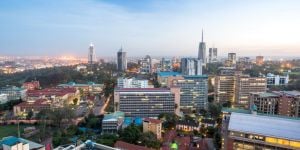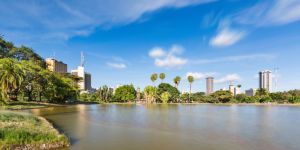Work Permit In Kenya
Subscribe to the topic
Post new topic
Any company where a foreign national may be hired as an employee.
The application process is laid down by law, so it isn't company specific. Companies are supposed to provide evidence that they have tried and failed to fill the vacancy from among the Kenyan labour market, as part of the application process. Corruption means that there is often a way to work around this if a specific company want to hire you.
Hey hi, I am Manuel and yes,I need a work permit, ( my reason is strong )
_my personal situation is a little different.
Because my wife is kenyan, and I have a daughter (she is kenyan// born in Kenya, // 2 years old )
I know very well it is illegal to stay in kenya more than 6 month (as a tourist)
But for me and my family is very hard / live separated .
(I,m not Kenyan).
I have hope in some day to obtain that work permit and live with my family 
Asante sana..-
Hello Manuel, unfortunately the rules around work permits don't take into account whether or not you are married to a Kenyan. I know because I am married to a Kenyan. It made no difference whatsoever.
If your wife is working, then the easiest (and cheapest) option may well be to get a Dependents Pass, which will allow you to remain in Kenya with your family, though work would not be permitted.
mister :: Longonot62 Wow that is perfect to me , that mans if a obtain "Dependents Pass" then Can I live in kenya for long time ( more than 6 Months ( I not kenyan ) ,. /( my job is very diferent , Because I work in forex // stock market , // cripto currency and so on ( I just need the internet :-) all the income is from out to kenya, ( all company are not kenyan alike me ) asante sana for your help 
Manuel.
The Dependents Pass will entitle you to remain in Kenya for over 6 months and technically, several years. It assumes that your wife works and earns enough money to support you both (she will probably have to provide evidence). Your wife would be the applicant. Before the new constitution, it was almost impossible for a man to obtain a Dependent Pass as there is a belief that men cannot be dependent upon women. This belief tends to persist, so your application might not be straightforward. The cost is Ksh 5000, I believe.
If you have an income in excess of $25,000 or equivalent, from sources outside Kenya, then you may be able to apply for a Class K permit. It costs Ksh 200,000 plus Ksh 10,000 admin fee and is valid for two years. Much costlier, but possibly another option for you.
More information here:
https://fathershandltd.com/about-us-2/passes/http://www.immigration.go.ke/Information.html
If you marry the mother to yr child and stay in Kenya with her, legally, for three years you can apply for Permanent Residency which is 50000 one off. According to the new constitution that also gives you a right to a work permit and even the right to own land, but the relevant laws have not included this yet.
To be eligible to apply for permanent residence as a spouse, you don't have to have lived in Kenya if you are married to a Kenyan citizen. Just married for over three years, with proof that the marriage is ongoing.
Permanent residency gives you the right to work without a work permit.
You can own land gazetted as residential, even if you just have a visitors (single entry) visa. Foreigners cannot legally buy agricultural land and I believe that is still the case if you have permanent residency.
To date, it has been a lengthy process for most applicants. I know of several people who have applied for PR or dual citizenship and have waited for years.
Hi Longonot. Happy that you try to enlighten newcomers to Kenya. Just a couple of comments. It is true you don't have to live here with your wife for all those three years, but you need a certificate of good conduct from CID on Kiambu road to enclose with your permanent residence application and they only issue that to foreigners who have lived here for 180 days, sometimes longer. The committee sometimes send someone to interview the applicant in their home. If you are not in the country when they want to see you, there will be delays and even refusals. The interviewers get sceptical if you haven't stayed here for a considerable time, unless you have been living abroad with the Kenyan citizen who you have married. As always in Kenya, the practice changes all the time and sometimes it is based on the daily mood of the officer.
About owning property, you can own a house, flat, maisonette and so on even when you are on a visa only, but I don't think you can own the land itself. It has to be on leased land, which is different from actual ownership. As a permanent resident you have the right to own land (not agricultural maybe), but this is so far only based on the constitution because the adequate land laws have not been changed so that they are in harmony of the constitution. However, if someone took the government to court on this he or she would probably win in the end since the constitution is stronger than the law.
Getting the permanent residence permit is not about luck. I have helped several persons through this procedure. But you need to have ALL papers in order, and there is quite a number of documents which need to be enclosed and one or two of your referees will actually often be contacted to check on your background. So make sure your refs know you well. It's basically about patience as the waiting time is between 12 and 16 months, at least for the applicants I know about. The staff on 5th or 7th floor (not sure) at Nyayo House are very helpful and will give you an idea how long you will have to wait. The committee was disbanded for a while and naturally all applications were put on hold for months. Now it's operative again. If you give it 18 months and all papers are in order and no bribes paid underway, you will probably get it.
Sorry, I wasn't precise about owning land. It is true, even as a permanent resident you cannot own any form of land, only the property like buildings etc. The land has to be leased for maximum 99 years.
Torewest, you can purchase and own freehold property as foreigner without resident status, as long as the land is gazetted as residential land. So, for example you could buy a residential plot and build a house on it. The key is the land use, not the house.
Thanks for the information on the PR process, but we are actually in the process of relocating to South Africa, for various reasons.
Good luck with South Africa, was in Cape last week, my favourite city. We seem to have many similar opinions. Great! But what you wrote today about residential land I think you could be wrong about. The constitution is clear. Only citizen can own land in Kenya, no matter what kind of land. Non-citizens who had bought land before 2010 actually have to change it into 99 years lease. But you can own the building itself. If you have other official info on this, please post it here. It would be revolutionary and go against all property lawyers I have met.
Torewest: I have been doing some reading and you are correct and I am not!
Prior to the new constitution, foreigners could own residential land outright, but now it must be leasehold. I would have thought that if the land is leasehold, any buildings would be too. Kenyan property laws are based on those of the UK and that is how it works there.
We will be settling in the Western Cape, place called Knysna. Selling our properties here and buying there!
thank you.
great information.
Can my spouse live with me on my work permit ? or both need different permits?
You can apply for a dependents pass for your spouse, which will allow him to live in Kenya, but he will not be permitted to work.
HI,
With regards to Manuel_R situation mine is somewhat similar though there are differences.
I have married to my spouse for 9+ years, we got married in Nairobi however we have lived in the Uk for all of the 9 years, we have a son and both my son and wife are dual nationals.
Would I be allegeable for residency based on the fact I have been married for 9 years?
Hi,
Thank you for sharing, how about east african citizen? Do I need an alien card before applying for the work permit?
Reason : Advertising of products and services is not allowed on the forum. Please register in the business directory.
We invite you to read the forum code of conduct
Is it not the case that if you register a company as a foreigner you can buy land, any land.
No, if you are not a Kenyan your company can not own land. Some foreigners have registered companies with kenyan shareholders or partners. If the kenyans have majority of the company I guess it can own land but the kenyan ownership has to be REAL. Many foreigners have been tricked this way. You know you cannot go to court if you feel tricked. Several cases at coast have been really bad for some non-kenyans
http://www.internationallawoffice.com/N … -in-Kenya#
Here you can read. So you can lease up to 99 years. But not fully own.
Sorry. It seems that one needs to register to read this. But I think It's free...
Yes a foreign individual or foreign company can own land, but leasehold only, for a maximum 99 year lease, as Torewest has stated. The lease is renewable.
For the purposes of buying land, the constitution defines a Kenyan company as a company owned by one of more Kenyan citizens. A Kenyan/foreign partnership is defined as a 'foreign company' and it will not be able to buy freehold land, or property.
Under the Land Control Act, a foreigner, or foreign owned company cannot buy/acquire agricultural land. However, the President can exempt a foreigner from this and it must be done through the Kenya Gazette.
If you have a Kenyan partner this may be different.
If you mean business partner it doesn't make a difference. If you mean being married to a Kenyan partner you can get Kenyan citizenship after about 7 years. You can buy land with your Kenyan spouse, but the title deed has to be in his/her name. If the marriage ends, something which is not uncommon these days, it happens frequently that the foreigner suddenly has no access to that land.
Snowmoon; I agree with Torewest. I have a Kenyan partner (wife) and the land we have bought has had to be in my wife's name exclusively. The properties we have bought are in joint names, but all leasehold.
However, when it comes to selling, I have had to give my permission for the land to be sold.
I imagine that the situation would only change if a foreign partner has gained citizenship.
Not quite what my lawyer advised , have much to learn!!
You can buy land with your Kenyan spouse, but the title deed has to be in his/her name.
Was informed that; you can set up a company with your spouse and share the company's assets and jointly own the land . If in both names,
it's all so vague!
Actually, it's quite clear. If the land is in the name of your Kenyan spouse, a court will consider it his/her. The foreigner is not allowed to own it.
A company with one or more foreign shareholders is not considered fully Kenyan.
Some lawyers are professionally lazy, some will tell you anything just to get the assignment, some might collude with people you know or not know. The serious ones will tell you the truth. Be careful about trust.
***
Reason : Please post only in english on the anglophone forum.
We invite you to read the forum code of conduct
How do I get working Visa and what are the costs? I have a Kenyan son who has been recognised for me at the childrens office since i have been father for him since he was 5 years old. So now we have 11 years of lovely path together. Where could i find out how it goes in my case?
I'm a member of a co-operative society and our main goal fo the future is to open up an organisation to help Kenyan youth.
This is a Business Permit for the Directors
Hi,
Unfortunately , the DOI will not recognize your adoption for purposes of issuance of a Work VISA.
Applications for Class D go strictly by the immigration scripts,
However, as you are keen on setting up an organization to assist Kenyan youth. You may register a Foundation or a Charitable organization and apply for a Class I permit. (Religious or Charitable work)..
Thats your best option.
Welcome.
ErbieH: I agree. adoption of a child is irrelevant in terms of whether you can obtain a work permit, as is marriage to a Kenyan (at least until you are eligible to apply for Permanent residency).
If you are already active in a co-operative society and you don't have a work permit, this activity will probably be classified as 'working', by the government and something for which, if caught, you can be instantly deported.
For starting a charity, or NGO, there is a registration process, which must be followed. i think that you need to do some research to find out which is more likely to make you eligible for a work permit - charitable trust or NGO.
Hello to all,
I was planning to go to Ghana, but got some advise to go to Kenya instead.
Indeed, it all seems less complicated and for my business I have more opportunities in Nairobi as in Accra.
Some questions remain; for this K-class (long term residence) I need to have an income of 25k; if my Dutch company signs a contact, promising me a fixed income of this 25k per year; this is sufficient proof? Of course I can show monthly payments then into my account. Or does it have to be pension?
Am I still allowed to work (online) from Kenya for my own company? If I want to expand to Kenya (only buying, not selling); can I work officially at that company (free of charge for all I care) as director?
I don't quite understand why 100k usd is needed to start a company. Surely there must be possibilities to start cheaply a local company. I want to hire staff, and give an official working contract. So I will only create jobs, not take any; costs (staff) are in Kenya, income (sales) abroad. I would charge the costs from Kenya to my Dutch company every month, bringing in Euro's. What is the best way to do that? In other coountries (in Asia) I couln't own a local company; there I just asked one of the employees to take it on his name. How are these things handled in Kenya?
Thanks to stupid Covid I now have to wait till (at least) April before I can visit! But I am already looking for staff,
A bit weird; some sites claim that Nairobi is one of the most expensive cities in Africa, others sites say costs in Nairobi are much less then in Accra.
<<for this K-class (long term residence) I need to have an income of 25k; if my Dutch company signs a contact, promising me a fixed income of this 25k per year; this is sufficient proof? Of course I can show monthly payments then into my account. Or does it have to be pension?>>
It doesnt really matter what the source of the income is, provided that it's not derived from employment in Kenya, so property rental, investments, dividends and so on. You have to be over 35yrs too.
<<Am I still allowed to work (online) from Kenya for my own company? If I want to expand to Kenya (only buying, not selling); can I work officially at that company (free of charge for all I care) as director?>>
The wording is to the effect that work in Kenya is prohibited. The laws were drawn up before work online became a realistic option and so its a bit of a grey area, but I don't think that there's much that can be done to stop you. However, if you expand your company, and work into Kenya, then you would be breaking the law, as you would then be working in Kenya - paid or unpaid work is prohibited with a Class K permit.
<<I don't quite understand why 100k usd is needed to start a company.>>
It is not quite like this. You can legally register a company in Kenya and it can operate, provided you do not work within your company in any capacity. Where the $100k comes in is if you want to work within/operate your company in Kenya, for which Class G Permit will be required. There is no shortcut for foreigners that I am aware of (see below). I understand that the idea behind this is to promote inward investment and prevent the country being flooded by foreigners starting and running low cost businesses and taking away that sector from local Kenyans.
<<I want to hire staff, and give an official working contract. So I will only create jobs, not take any; costs (staff) are in Kenya>>
This would be classed as 'working', if you are doing the hiring.
<<I couln't own a local company; there I just asked one of the employees to take it on his name. How are these things handled in Kenya?>>
You could do something similar in Kenya, but I have sadly heard so many stories of local partners stealing/creaming off the profits, to the point where the business doesn't thrive. If your partner/manager doesn't have a car when s/he starts the job, one will have been bought next time you see them! Finding a trustworthy and completely honest partner could be a major challenge.
There was a method sometimes used where your company, having been established, would effectively hire you as an employee, getting around the $100k rule. However, Immigration have become aware of this and additionally, companies must evidence that there are no suitably qualified Kenyans to fulfil the role, so the application may well be refused.
Thanks a lot, (almost) all clear!
For G-class it is important then HOW they see this 100k investment, real cash influx, or just administrative.
I don't have 100k cash, and even if I had I couldn't invest it quickly enough. I do have merchandise in this amount, and I could put it on the balance sheet; if they would accept that as investment (which it is), it's okay. I would keep the stock outside the country, to avoid import duties, but it would be owned by the company.
When going for K-class, it's clear; I don't do nothing and sleep all day! Find a partner to do all the work. Doesn't sound bad either. Unfortunately I talk in my sleep, telling people what to do, but that isn't work... But they seem very strict, if even hiring Kenyans is prohibited.
"... but I have sadly heard so many stories of local partners stealing/creaming off the profits, to the point where the business doesn't thrive."
It's not different in Asia, people are people. But I know how to handle that.
<<For G-class it is important then HOW they see this 100k investment, real cash influx, or just administrative.>>
The official government wording is:
"Documentary proof of capital to be invested at least USD 100,000"
I doubt that assets held outside Kenya would be satisfactory, as the expectation is that the $100,000 should be invested in the country. I did once apply for a Class G, as I did have the required amount in liquid assets. I had to provide financial statements to evidence this. Unfortunately, barriers kept being thrown up during the application process in terms of requirements for further licences and permissions from other government departments that I withdrew the application.
Kenya government processes are incredibly bureaucratic.
<<When going for K-class, it's clear; I don't do nothing and sleep all day! Find a partner to do all the work.>>
That is basically it and is one of the main reasons I returned to the UK, through sheer boredom!!! Sure, your company can hire Kenyans, but if you were involved in interviewing them, this is likely to be interpreted as 'work'. The Class K is one of the easier permits to apply for, with the fewest requirements - Kenya is keen to attract inward investment.
<<It's not different in Asia, people are people. But I know how to handle that.>>
Are you sure about that? If your Kenyan business partner gets greedy, s/he could report you to Immigration for working - even walking into an office and checking the books would be defined as such and you could be deported. It has happened!
There is a short term 'Special Pass' available, on application, which would permit you to temporarily carry out business activities, in Kenya for a few days or weeks only. To obtain it, you must have a detailed and signed cover letter from the relevant organisation, plus quite a few other documents, which you can check here:
https://fns.immigration.go.ke/infopack/ … ecialpass/
I understand that it is extendable to a max 90 days. Fee was something like Kes 15000 per month.
This might work in a scenario where you are not Kenya based, but visit periodically. To the best of my knowledge you would be unable to serially apply for this, as immigration would then (legitimately) argue that you should apply for a work permit of some sort.
I think Longonot just gave you the best advice I have read on this forum on permits class K and G.
On the economic side a K class would be easier and it can easily set you on an easier path to PR provided you did not break any laws and your immigration papers are ok by the time you spend at least 5-7 yrs in Kenya.
There are still very good locals here to help you start a company without you managing it directly but you need to be on ground and you need an airtight agreement that can hold up if they breach contract.
If you are not married, a kenyan wife be very ideal for Class K, you simply set things up in her name and run your business from the side provided you dnt show up as working in the office or make public decisions where you are known.
just my thoughts.
Articles to help you in your expat project in Nairobi
 Work in Nairobi
Work in NairobiExpats hoping to find work in Nairobi will find a diverse city with many opportunities, especially in finance, ...
 Registering company branch in kenya
Registering company branch in kenyaTo be able to register a company branch in Kenya, you will need the following:
 Setting up a business in Kenya
Setting up a business in KenyaKenya attracts much attention from international investors, thanks to its high GDP, its position as the economic ...
 Working in Kenya
Working in KenyaExpat workers in Kenya may find the business culture and way of working slightly different than their home ...
 Nairobi Expat Social (NES)
Nairobi Expat Social (NES)Nairobi Expat Social (NES) was set up on 1 Feb 2010 to provide expats living in Kenya with a social network for ...
 Accommodation in Nairobi
Accommodation in NairobiMany expats moving to Kenya are likely to find themselves relocating to Nairobi, as it is both the nations capital ...
 Marriage in Kenya
Marriage in KenyaIf you are planning a marriage in Kenya, the Registrar of Marriages in Nairobi is the best starting point for ...
 Leisure activities in Kenya
Leisure activities in KenyaNew expats to Nairobi will find plenty of things to see and do, from museums, national parks, sporting events, and ...
Find more topics on the Nairobi forum




